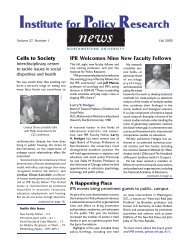pdf - Institute for Policy Research - Northwestern University
pdf - Institute for Policy Research - Northwestern University
pdf - Institute for Policy Research - Northwestern University
You also want an ePaper? Increase the reach of your titles
YUMPU automatically turns print PDFs into web optimized ePapers that Google loves.
B. de Blok<br />
The aim of IFS is to in<strong>for</strong>m policymakers<br />
on how Illinois families have been faring<br />
since the implementation of welfare<br />
re<strong>for</strong>m. The study received funding from<br />
the Department of Education, NICHD,<br />
Administration <strong>for</strong> Children and Families,<br />
Chicago Community Trust, Joyce<br />
Foundation, John D. and Catherine T.<br />
MacArthur Foundation, and Polk Bros.<br />
Foundation.<br />
Celeste Watkins-Hayes, assistant<br />
professor of sociology and African<br />
American studies, is completing a book<br />
manuscript, “The Situated Bureaucrat:<br />
Race, Class, and the Changing Terrain<br />
of Human Services.” In it, she explores<br />
how the professional and social<br />
identities of street-level bureaucrats<br />
shape how low-income families receive<br />
welfare services. Against the backdrop<br />
of increasing income inequality, work<br />
requirements <strong>for</strong> impoverished mothers,<br />
and a restructured social safety net, this<br />
study provides an in-depth look at the<br />
inner workings of a poverty relief agency.<br />
As welfare offices attempt to shift their<br />
organizational model from one of writing<br />
checks and monitoring fraud to an<br />
increasingly professionalized institution,<br />
caseworkers and others advance their<br />
own interpretations of how to trans<strong>for</strong>m<br />
their clients, the office, and their work.<br />
For these situated bureaucrats, the politics<br />
of professional roles and racial, class, and<br />
community interests give rise to distinct<br />
interpretations of what “helping the poor”<br />
looks like.<br />
Child Welfare System<br />
With a grant from the Searle Fund <strong>for</strong><br />
<strong>Policy</strong> <strong>Research</strong>, Dorothy Roberts is<br />
completing research on the communitylevel<br />
effects of the disproportionate<br />
number of African American<br />
children in child welfare systems.<br />
She interviewed 27 black women in<br />
the predominantly black Chicago<br />
neighborhood of Woodlawn, which has<br />
high rates of foster-care placement. The<br />
residents were all aware of intense child<br />
welfare agency involvement in their<br />
neighborhood and identified profound<br />
effects on family and community<br />
relationships, including interference<br />
with parental authority, family conflicts<br />
over placement of children in foster<br />
care, damage to children’s ability to <strong>for</strong>m<br />
social relationships, and distrust among<br />
neighbors. Yet most of the women did not<br />
believe that the Illinois Department of<br />
Children and Family Services was overly<br />
involved in their neighborhood—calling,<br />
in fact, <strong>for</strong> greater agency involvement to<br />
provide <strong>for</strong> families’ needs.<br />
Roberts concludes that the residents of<br />
such neighborhoods must increasingly<br />
rely on child protection agencies <strong>for</strong><br />
needed financial<br />
assistance because of<br />
the growing dearth of<br />
social programs in these<br />
neighborhoods. She<br />
explores the implications<br />
of these findings <strong>for</strong> a<br />
new research paradigm<br />
<strong>for</strong> addressing racial<br />
disproportionality<br />
and to understand the<br />
impact and role of<br />
child welfare agencies<br />
in African American<br />
neighborhoods.<br />
Child Development<br />
Labor economist Raquel Bernal is<br />
interested in the determinants of<br />
children’s cognitive ability. In particular,<br />
she is looking at how mothers’<br />
employment and childcare decisions<br />
affect their children’s cognitive<br />
development. She finds that a child of<br />
a full-time working mother in childcare<br />
during the first five years of life can have<br />
as high as an 8.8 percent reduction in<br />
ability test scores. She also assesses the<br />
impact of policies on women’s decisions<br />
www.northwestern.edu/ipr 11
















